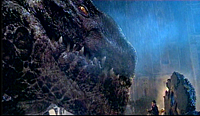The Passion of the Kong
How to Turn a Classic into a Masterpiece
An Appreciation by Barry M. Lamont
1996 Peter Jackson's Remake
Peter Jackson decided to become a filmmaker after he saw the 1933 King Kong as a child; he even did his own stop-motion recreations of a few scenes. He was all set to start making his own version of King Kong in 1996, when the studio pulled the plug. This did not reflect a lack of faith in Jackson himself. Two other "big creature" remakes were already planned: Mighty Joe Young and Godzilla,
both ultimately released in 1998, both of which used CGI (computer-generated imagery or computer graphic imaging, take your pick) to create a new, more convincing title character. King Kong would have been the third such movie in a row, and the studio simply thought the market wouldn't support three films of that type. However, they did want to work with him, and they had another project in mind. Had he ever heard of The Lord of the Rings?
Beyond its own obvious merits, that project proved essential to the creation of Jackson's 2005 King Kong. In a practical sense, it gave him a great deal of clout, both because of the critical success of LotR (including a pile of Academy Awards, given mostly to the third film but obviously meant to honor the whole trilogy) and - more importantly to the studios - because of the financial success of the films and their various DVD incarnations.
The technical mastery gained was even more important. The Lord of the Rings put Weta (New Zealand) on the map as a top-tier special effects studio, just as Star Wars had built ILM (Industrial Light and Magic) for George Lucas. Several programs developed and utilized to realize Jackson's vision of LotR were directly applicable to King Kong. None were more important than "mocap".
Beyond its own obvious merits, that project proved essential to the creation of Jackson's 2005 King Kong. In a practical sense, it gave him a great deal of clout, both because of the critical success of LotR (including a pile of Academy Awards, given mostly to the third film but obviously meant to honor the whole trilogy) and - more importantly to the studios - because of the financial success of the films and their various DVD incarnations.
The technical mastery gained was even more important. The Lord of the Rings put Weta (New Zealand) on the map as a top-tier special effects studio, just as Star Wars had built ILM (Industrial Light and Magic) for George Lucas. Several programs developed and utilized to realize Jackson's vision of LotR were directly applicable to King Kong. None were more important than "mocap".
